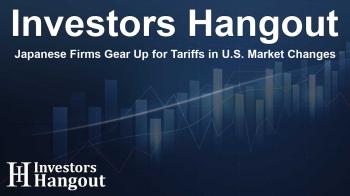Japanese Firms Gear Up for Tariffs in U.S. Market Changes

Japanese Companies Strategize for U.S. Market Challenges
Many businesses from Japan operating in the United States are actively preparing for potential tariff changes ushered in by the new administration. This insightful information comes from a survey conducted by the Japan External Trade Organization, which highlights how these firms are bracing themselves for economic shifts.
Survey Insights on Tariff Impact
According to the survey that targeted 694 companies, a significant number fear that impending tariffs could negatively affect their operations. Among the 123 respondents who felt they would be impacted by these tariff policies, almost three-quarters expressed concerns about adverse effects on their business performance.
Shifts in Strategy Amidst Uncertainty
In response to these tariff threats, many Japanese companies are looking to bolster their manufacturing and procurement efforts within the U.S. This strategic shift is coupled with discussions about potential price increases for their products, which might be necessary to remain competitive under new tariff conditions.
Concerns Over Broader Economic Implications
Beyond tariffs directly related to their products, Japanese companies are also wary of U.S. excise taxes that may impact businesses globally. Notably, a proposed 60% tariff on goods from China could have ripple effects on supply chains, causing further uncertainty.
The Human Element: Immigration and Labor Shortages
Additionally, the survey highlights that over 60% of respondents expecting shifts in U.S. immigration and visa policies foresee negative consequences stemming from potential labor shortages. The apprehensions around workforce availability could significantly hamper operational capabilities for many firms.
Looking Ahead: Strategic Adjustments Required
The current landscape presents both challenges and opportunities for Japanese firms in the U.S. Keeping an eye on legislative changes while adapting their business strategies will be crucial for sustained success. Firms that can navigate these uncertainties effectively might position themselves advantageously as the market evolves.
Frequently Asked Questions
What are Japanese companies doing to prepare for tariffs?
Japanese companies are strengthening U.S. manufacturing and procurement while considering price hikes for their products.
What did the survey reveal about the impact of tariffs?
The survey indicated that nearly 75% of responding companies expect tariffs to have negative effects on their business.
How might U.S. excise taxes affect Japanese businesses?
Japanese companies are concerned that U.S. excise taxes may create significant obstacles to doing business internationally.
Why do labor shortages matter for Japanese firms?
Labor shortages could impede operations, affecting productivity and the ability to respond to market demands efficiently.
What future strategies should Japanese companies adopt?
They should be prepared to adjust their strategies continually, focusing on flexibility in manufacturing and pricing in response to market changes.
About The Author
Contact Owen Jenkins privately here. Or send an email with ATTN: Owen Jenkins as the subject to contact@investorshangout.com.
About Investors Hangout
Investors Hangout is a leading online stock forum for financial discussion and learning, offering a wide range of free tools and resources. It draws in traders of all levels, who exchange market knowledge, investigate trading tactics, and keep an eye on industry developments in real time. Featuring financial articles, stock message boards, quotes, charts, company profiles, and live news updates. Through cooperative learning and a wealth of informational resources, it helps users from novices creating their first portfolios to experts honing their techniques. Join Investors Hangout today: https://investorshangout.com/
The content of this article is based on factual, publicly available information and does not represent legal, financial, or investment advice. Investors Hangout does not offer financial advice, and the author is not a licensed financial advisor. Consult a qualified advisor before making any financial or investment decisions based on this article. This article should not be considered advice to purchase, sell, or hold any securities or other investments. If any of the material provided here is inaccurate, please contact us for corrections.

